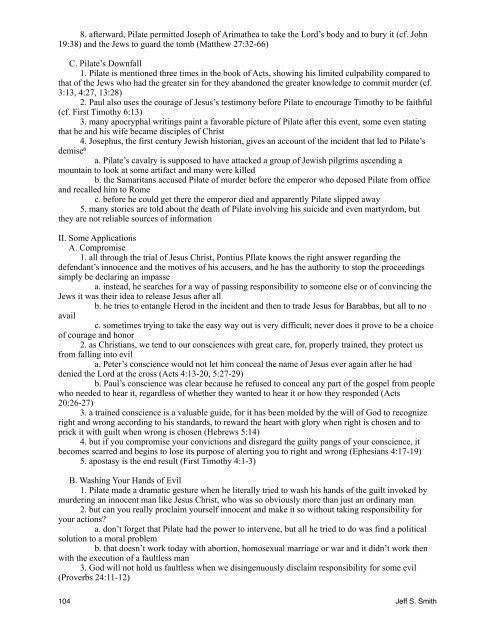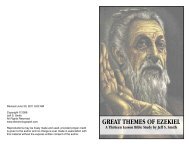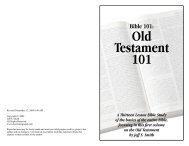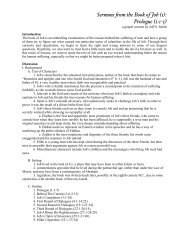8. afterward, Pilate permitted Joseph of Arimathea to take the Lord’s body and to bury it (cf. John19:38) and the Jews to guard the tomb (Matthew 27:32-66)C. Pilate’s Downfall1. Pilate is mentioned three times in the book of Acts, showing his limited culpability compared tothat of the Jews who had the greater sin for they abandoned the greater knowledge to commit murder (cf.3:13, 4:27, 13:28)2. Paul also uses the courage of Jesus’s testimony before Pilate to encourage Timothy to be faithful(cf. First Timothy 6:13)3. many apocryphal writings paint a favorable picture of Pilate after this event, some even statingthat he and his wife became disciples of Christ4. Josephus, the first century Jewish historian, gives an account of the incident that led to Pilate’sdemise 6a. Pilate’s cavalry is supposed to have attacked a group of Jewish pilgrims ascending amountain to look at some artifact and many were killedb. the Samaritans accused Pilate of murder before the emperor who deposed Pilate from officeand recalled him to Romec. before he could get there the emperor died and apparently Pilate slipped away5. many stories are told about the death of Pilate involving his suicide and even martyrdom, butthey are not reliable sources of informationII. Some ApplicationsA. Compromise1. all through the trial of Jesus Christ, Pontius PIlate knows the right answer regarding thedefendant’s innocence and the motives of his accusers, and he has the authority to stop the proceedingssimply be declaring an impassea. instead, he searches for a way of passing responsibility to someone else or of convincing theJews it was their idea to release Jesus after allb. he tries to entangle Herod in the incident and then to trade Jesus for Barabbas, but all to noavailc. sometimes trying to take the easy way out is very difficult; never does it prove to be a choiceof courage and honor2. as Christians, we tend to our consciences with great care, for, properly trained, they protect usfrom falling into evila. Peter’s conscience would not let him conceal the name of Jesus ever again after he haddenied the Lord at the cross (Acts 4:13-20, 5:27-29)b. Paul’s conscience was clear because he refused to conceal any part of the gospel from peoplewho needed to hear it, regardless of whether they wanted to hear it or how they responded (Acts20:26-27)3. a trained conscience is a valuable guide, for it has been molded by the will of God to recognizeright and wrong according to his standards, to reward the heart with glory when right is chosen and toprick it with guilt when wrong is chosen (Hebrews 5:14)4. but if you compromise your convictions and disregard the guilty pangs of your conscience, itbecomes scarred and begins to lose its purpose of alerting you to right and wrong (Ephesians 4:17-19)5. apostasy is the end result (First Timothy 4:1-3)B. Washing Your Hands of Evil1. Pilate made a dramatic gesture when he literally tried to wash his hands of the guilt invoked bymurdering an innocent man like Jesus Christ, who was so obviously more than just an ordinary man2. but can you really proclaim yourself innocent and make it so without taking responsibility foryour actions?a. don’t forget that Pilate had the power to intervene, but all he tried to do was find a politicalsolution to a moral problemb. that doesn’t work today with abortion, homosexual marriage or war and it didn’t work thenwith the execution of a faultless man3. God will not hold us faultless when we disingenuously disclaim responsibility for some evil(Proverbs 24:11-12)104! Jeff S. Smith
a. sometime you may be the only one around who can right a wrong or stand up for someoneand will you wash your hands of their trial because it would put you in danger or expose you to the sameslander and bitterness that was aimed at them?b. it is God who gives opportunities to do right and the same God will hold us accountablewhen we choose to ignore them (James 4:17)4. the hardening of Pharaoh’s heart was little more than God-given opportunity meeting hard-nosedhumanity; we lament Pharaoh’s folly, but will we replicate it as well?C. What is Truth?1. consider again Pilate’s great philosophical response to Jesus (John 18:37-38)2. Pilate wasn’t a seeker of truth like Nicodemus, or he would have stayed by the Lord’s side tohear an answer; instead he walked outside, convinced that Jesus was not a rival to Caesar and not a threatto Judea3. as for truth, it was meaningless to a moral relativist like Pontius Pilate, who has manydescendants in the world todaya. many who dismiss the concept of an objective, identifiable, singular truth that eliminates allother claims as mere pretenseb. others who espouse the ironic concept that there are many equally viable but contradictorytruths, found in religion, philosophy, even atheismc. still others who consider a truth true until there are consequences, at which point some liebecomes the new truth, for the sake of politics or convenience or prosperity and at the expense ofrighteousness and salvation4. the question “What is truth” had long confounded the many contradictory schools of Greekphilosophy, competing to become the answer to that questiona. Pilate considered Jesus to be an ignorant Hebrew fanatic and he mocked him by puttingbefore him the curiosity of the deepest Greek thinkersb. Barnes writes, “Thousands ask the question in the same way. They have a fixed contempt forthe Bible; they deride the instructions of religion; they are unwilling to investigate and to wait at the gatesof wisdom; and hence, like Pilate, they remain ignorant of the great Source of truth, and die in darknessand in error. All might find truth if they would seek it; none ever will find it if they do not apply for it tothe great source of light-the God of truth, and seek it patiently in the way in which he has chosen tocommunicate it to mankind. How highly should we prize the Bible! And how patiently and prayerfullyshould we search the Scriptures, that we may not err and die for ever!” 75. God’s word is a truth that sets believers apart from unbelievers (cf. John 17:17), “a lamp to myfeet and a light to my path” (Psalm 119:105)a. truth is as singular as is God, the church and baptism (cf. Ephesians 4:1-6)b. it is objective and not vulnerable to the shifting sands of popular approval or denominationaledictc. it liberates us from sin, error, superstition, self-delusion, carnal ambition, speculation,sectarianism and every false way (John 8:31-36)ConclusionUnless the apocryphal writers can be believed, Pilate lived and died with little character beyond thepolitical. For men today to rise above his ignominious end, we must stand on conviction and avoidcompromising the integrity of our consciences.<strong>Character</strong> <strong>Studies</strong>! 105
- Page 1:
CharacterStudiesby Jeff S. Smith
- Page 5:
Character StudiesThe goal of these
- Page 8 and 9:
2. she points backward to his defea
- Page 10 and 11:
2. Jesus knew he was not an oversiz
- Page 12 and 13:
6! Jeff S. Smith
- Page 14 and 15:
2. when the local church is involve
- Page 16 and 17:
10! Jeff S. Smith
- Page 18 and 19:
D. No Luther1. it fell to the apost
- Page 20 and 21:
14! Jeff S. Smith
- Page 22 and 23:
c. is the antithesis of Diotrephes
- Page 24 and 25:
2. and then he rebukes him for his
- Page 26 and 27:
20! Jeff S. Smith
- Page 28 and 29:
2. before gaining his victory over
- Page 30 and 31:
II. Practical ApplicationA. A Lesso
- Page 32 and 33:
a. we are all bending over so easil
- Page 34 and 35:
ConclusionJoseph was faithful to Go
- Page 36 and 37:
a. that, I think, is the great maje
- Page 38 and 39:
a. he had to leave his home, where
- Page 40 and 41:
34! Jeff S. Smith
- Page 42 and 43:
3. when Isaac became old and blind,
- Page 44 and 45:
II. Man’s New BeginningA. The Old
- Page 46 and 47:
1. every time the gospel is preache
- Page 48 and 49:
4. Elijah now has his turn, once th
- Page 50 and 51:
44! Jeff S. Smith
- Page 52 and 53:
a. we, like they, are strangers and
- Page 54 and 55:
D. Deliverer Appointed1. when God s
- Page 56 and 57:
50! Jeff S. Smith
- Page 58 and 59:
. those with little would be moved
- Page 60 and 61: . in one fell swoop, he takes out a
- Page 62 and 63: 56! Jeff S. Smith
- Page 64 and 65: 3. it is not that some earn God's f
- Page 66 and 67: 60! Jeff S. Smith
- Page 68 and 69: C. The Pleasures of Sin Are Passing
- Page 70 and 71: 64! Jeff S. Smith
- Page 72 and 73: 3. reaching our land of milk and ho
- Page 74 and 75: 68! Jeff S. Smith
- Page 76 and 77: 1. he believed, but he was not yet
- Page 78 and 79: 72! Jeff S. Smith
- Page 80 and 81: 1. we must know the Bible and be ab
- Page 82 and 83: 76! Jeff S. Smith
- Page 84 and 85: 2. David took care to respect the p
- Page 86 and 87: a. if he complains about having to
- Page 88 and 89: . later in life, we see Herod Antip
- Page 90 and 91: 84! Jeff S. Smith
- Page 92 and 93: 2. this Aaronic priesthood executed
- Page 94 and 95: 88! Jeff S. Smith
- Page 96 and 97: 4. that more acute, more spiritual,
- Page 98 and 99: D. His Defense (cf. Acts 7:1-50)1.
- Page 100 and 101: 94! Jeff S. Smith
- Page 102 and 103: A. Concern For Others, Even Servant
- Page 104 and 105: 98! Jeff S. Smith
- Page 106 and 107: II. Some ApplicationsA. Their Chara
- Page 108 and 109: 102! Jeff S. Smith
- Page 112 and 113: 106! Jeff S. Smith
- Page 114 and 115: D. A Student1. the eunuch is in fac
- Page 116 and 117: 110! Jeff S. Smith
- Page 118 and 119: a. it was no more a blessing to dwe
- Page 120 and 121: 114! Jeff S. Smith
- Page 122 and 123: D. His Palace1. Nebuchadnezzar’s
- Page 124 and 125: 118! Jeff S. Smith
- Page 126 and 127: language, creating different tongue
- Page 128 and 129: 122! Jeff S. Smith
- Page 130 and 131: 4. Naomi returns in deep bitterness
- Page 132 and 133: 126! Jeff S. Smith
- Page 134 and 135: . it is not hard to imagine that th
- Page 136 and 137: 130! Jeff S. Smith
- Page 138 and 139: C. Pointing at The Antichrist1. a f
- Page 140 and 141: 134! Jeff S. Smith
- Page 142 and 143: Sufficient cause for the unpopulari
- Page 144 and 145: 138! Jeff S. Smith
- Page 146 and 147: 2. and so the wisdom of the magi wa
- Page 148 and 149: 142! Jeff S. Smith
- Page 150 and 151: courier it to Paul and it became to
- Page 152 and 153: 146! Jeff S. Smith
- Page 154 and 155: illions of souls from benefiting is
- Page 156 and 157: 150! Jeff S. Smith
- Page 158 and 159: 17:15-21)2. the birth was announced
- Page 160 and 161:
154! Jeff S. Smith
- Page 162 and 163:
. Thomas insisted that he would onl
- Page 164 and 165:
158! Jeff S. Smith
- Page 166 and 167:
2. first, he becomes the epitome of
- Page 168 and 169:
162! Jeff S. Smith
- Page 170 and 171:
esteem, wondering what we will do w
- Page 172 and 173:
166! Jeff S. Smith
- Page 174 and 175:
its soothing aroma and pain-relievi
- Page 176 and 177:
170! Jeff S. Smith
- Page 178 and 179:
3. this is the last that we hear of
- Page 180 and 181:
174! Jeff S. Smith
- Page 182 and 183:
and both began to return once he wa
- Page 184 and 185:
178! Jeff S. Smith
- Page 186 and 187:
led to the execution of innocent Na
- Page 188 and 189:
182! Jeff S. Smith
- Page 190 and 191:
government or of an occupying power
- Page 192 and 193:
186
- Page 194 and 195:
to cooperate with her scheme; how c
- Page 196 and 197:
190
- Page 198 and 199:
1. literal slavery like the kind th
- Page 200 and 201:
3. when Lot chose to live in Sodom,
- Page 202 and 203:
196
- Page 204 and 205:
Christ3. they have the mission to t
- Page 206 and 207:
200
- Page 208 and 209:
a. he is frequently described as a
- Page 210 and 211:
204
- Page 212 and 213:
II. Some ApplicationsA. Prodigies a
- Page 214 and 215:
a. the other bureaucrats turned him
- Page 216 and 217:
21:20-25)a. it is safe to say that
- Page 218 and 219:
212
- Page 220 and 221:
Ittai)b. as much as he hated what h
- Page 222 and 223:
216
- Page 224 and 225:
II. Some ApplicationsA. Decisive Th
- Page 226 and 227:
or friendship at all (First John 3:
- Page 228 and 229:
c. Antipas was part of the tennis m
- Page 230 and 231:
224
- Page 232 and 233:
3. Silas begins and ends his Bible
- Page 234 and 235:
26Brown, Driver, Briggs and Geseniu









